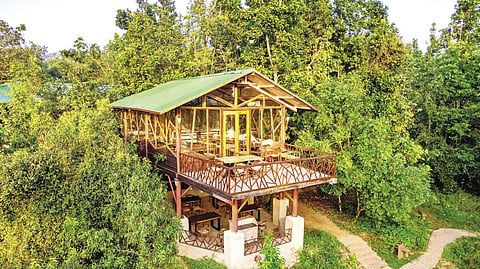Indians are heading forest-wards in unprecedented numbers to spot the elusive fauna that dot protected national parks. The post-Covid era is witnessing a significant spurt in wildlife tourism in India. According to hospitality consultants Hotelivate, at the start of 2022, there were 1,139 branded hotel rooms catering to wildlife tourism. By 2025, this number is expected to reach 2,793 rooms – a 145 per cent growth in four years at a CAGR of 25 per cent per annum. Cashing in on are players who got an early start, including Jungle Camps, which has four outposts and are looking to expand fast.
“We started Jungle Camps driven by our passion for nature and adventure and that passion remains at the core of everything we do,” points out GS Rathore, founder, Jungle Camps India. “Over the past 18 years, we’ve dedicated ourselves to wildlife hospitality, which has given us invaluable experience and a deep understanding of our guests’ desires. Our long-standing presence has allowed us to build strong relationships with our guests, many of whom have expressed a desire to see our unique blend of comfort and wilderness in other national parks across India, a driving force behind our decision to expand.”
The market’s current competitiveness is a signal that the demand for quality hospitality experiences is high, Rathore feels. “By expanding now, we can leverage this demand, attract more guests, and provide them with the exceptional service and unique experiences they expect from Jungle Camps.”
Experiences, expansion Jungle Camps began with an outpost in Pench in southeast Madhya Pradesh. “Pench Jungle Camp taught us the importance of harmonising our designs with the natural landscape,” informs Rathore.
It’s a philosophy the brand has only built over time. “One of the critical learnings from Pench has been the importance of integrating the camp seamlessly into its natural surroundings,” adds Yash Rajput, general manager, Pench Jungle Camp. “The camp has always prioritised designing around the landscape rather than over it, emphasising minimal use of concrete and maximal use of eco-friendly materials.”
“We have a profound understanding of what it takes to create memorable and enriching experiences for our guests,” says Rathore, highlighting the USPs of the lodges. “This expertise allows us to offer unparalleled service and insights into the local ecosystems.” It is also looking at expanding the premiumness of its offerings. “The elevated luxury cottages at Kanha Jungle Camp, which provide a unique tree house experience not available anywhere else in Kanha National Park, have been a huge success amongst the guests,” affirms Saurabh Garg, GM, Kanha. While the average room rates fluctuate across the properties, they range from R11,000 to R15,000, reveals Abhishek Aggarwal, head, sales & strategy.
While the competition has only grown in recent years in central India, including from IHCL’s TajSafaris, Samode and a number of other standalone boutique properties, Jungle Camps is planning to expand its presence. The group has 31 keys at Pench Jungle Camp, 24 at Tadoba, 21 at Kanha and eight keys at Rukhad Jungle Camp. Notably, each is unique in its look and feel, offering differentiated experiences within the group. The newest, Rukhad, is located in the midst of a jungle, offering a unique stay experience.
Jungle Camps plans to add almost 170 rooms in the next three years. Projects at locations like Sanjay Dubri Tiger Reserve, Bandhavgarh Tiger Reserve, Sariska Tiger Reserve and Kuno National Park are some of the projects that Jungle Camps is working towards, reveals Rathore.

